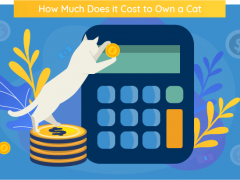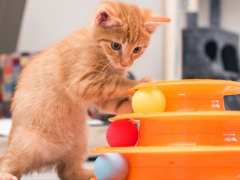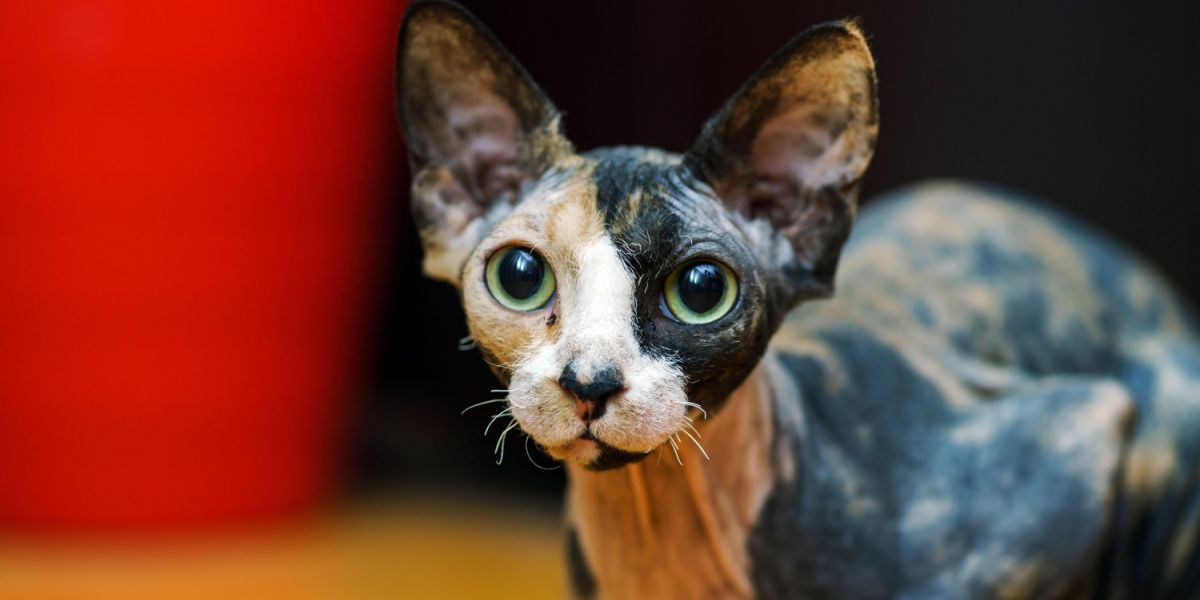
I’m often asked if cats, like people, suffer from heart attacks. Technically the answer is “No” since a heart attack in a person typically involves a blockage of a coronary artery (arteriosclerosis.)
When this happens, blood flow to a part of the heart muscle is cut off and that piece of heart muscle dies. This typically doesn’t happen in cats. However, cats do get heart disease and it’s important to diagnose and treat this early to allow the cat the best chances of survival.
What Kind of Heart Disease Does a Cat Get?
Cats typically develop a heart condition called cardiomyopathy. The 2 most common forms are dilated cardiomyopathy and hypertrophic cardiomyopathy. Dilated cardiomyopathy is extremely rare since its cause, low dietary taurine, was discovered around 30-40 years ago and pet food manufacturers began adding additional taurine to diets.
Hypertrophic cardiomyopathy (HCM) is the most common form of heart disease in cats. While it can affect any cat, the “typical” patient is
In cats with HCM, the heart muscle thickens, decreasing the heart’s pumping ability. Although the cause of HCM has not been clearly identified, the fact that the condition is more prevalent in certain breeds (including Maine Coon, Ragdoll, British Shorthair, Sphynx, Chartreux, and Persian cats) and that mutations of several cardiac (heart) genes have been identified in some cats with this disease suggests that genetics plays a role.
How Is Heart Disease Diagnosed in Cats?
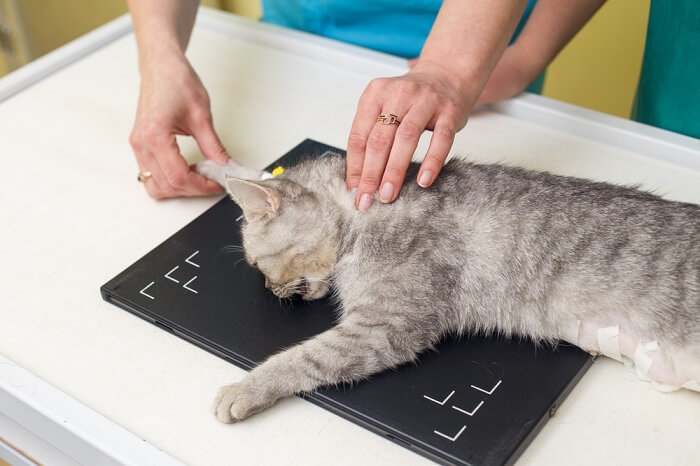
If your cat exhibits signs of heart disease like coughing, difficulty breathing, lethargy, and other symptoms, your vet will recommend further testing.
Heart disease is suspected based upon clinical signs such as coughing (rarer in cats than in dogs,) difficulty breathing, abdominal breathing, abdominal enlargement (due to fluid accumulation,) lack of appetite (anorexia,) lethargy, reluctance to move, hiding, and breathing with the mouth open (always an emergency sign as cats, like dogs but unlike people, tend to breathe mostly with the nostrils unless severe respiratory or cardiac disease is present.)
I also suspect heart disease anytime I hear a heart murmur during a physical examination. Many doctors and pet parents ignore the significance of finding a heart murmur in a “normal” cat or dog.
However, this is a huge mistake as hearing a heart murmur during a routine physical is often the first and only sign of a potentially serious heart problem.
Finally, I suspect heart disease whenever I detect an abnormal EKG during a pet’s preop evaluation or as part of a normal physical for a middle-aged or older cat.
Ultimately, if heart disease is suspected, further testing, including radiographs (X-rays) and an echocardiogram, is needed to determine the presence of heart disease, stage of heart disease, if medications are needed, and prognosis for the cat.
Yes, this testing and treatment is expensive. This is one of the reasons I recommend pet insurance so that we can pursue helping these cats.
Please note that the standard blood and urine tests are done to look at coexisting issues and because some diseases like hyperthyroidism can cause mild heart disease that typically resolves when treated.
What Are the Clinical Signs of Heart Disease in Cats?
In my practice, HCM is typically diagnosed in asymptomatic cats who do not appear to be ill. In many practices that don’t do as much wellness care as we do, cats with HCM may show clinical signs including labored or rapid breathing, open-mouthed breathing, and lethargy, due to fluid accumulation in or around the lungs or as a result of decreased heart pumping ability.
A serious and potentially life-threatening consequence of HCM is the formation of blood clots in the heart of the cat with HCM. These clots may travel through the bloodstream and then obstruct the flow of blood in other parts of the body (a condition called thromboembolism).
The signs seen with the clot depend on its location; most commonly there is a blockage of blood flow to the hind legs, causing acute hind limb pain or paralysis. Affected limbs may be cold, and the skin pales due to decreased blood flow to the affected limbs.
Diagnosing HCM and treating the condition early and aggressively can help decrease the severity of clinical signs and may decrease the likelihood of thromboembolism. Although relatively rare, cats with HCM are at risk for sudden death due to severe congestive heart failure.
How Is Heart Disease Treated in Cats?
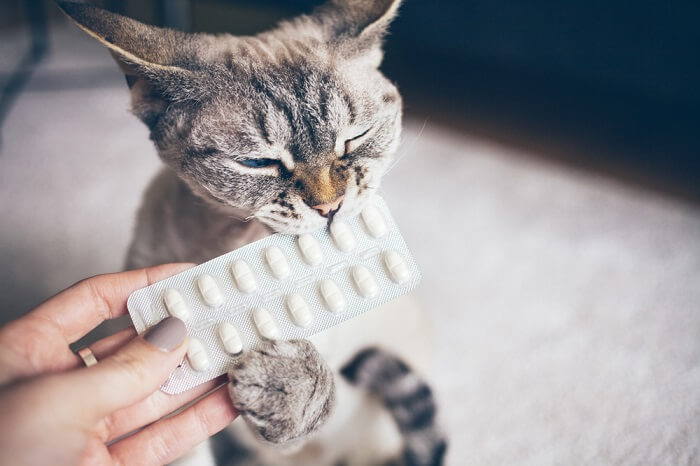
Treatment of heart disease in cats generally involves medication. The specific type of medication used will depend on a combination of factors.
Various medications can be prescribed for the cat with heart disease. Which medication is used is based upon clinical signs, echocardiographic diagnosis (stage of disease,) and ease of administration.
Medications can include drugs like diuretics to remove fluid from the lungs or chest cavity and drugs to make the heart pump more effectively, and if needed slow down the heart rate. For cats with dilated cardiomyopathy, taurine is also needed as this disease is caused by taurine deficiency.
Supplements are commonly used in cats with heart disease to reduce inflammation, provide energy to heart muscle, and help the heart beat more efficiently. Supplements include fish oil, antioxidants, coenzyme Q-10, hawthorn, and various homeopathics such as Apis and Crataegus.
What’s the Prognosis for a Cat With Heart Disease?
In general, the earlier the diagnosis the better the long-term outlook. In my practice, because heart disease is typically diagnosed early, most of these pets live normal lives. However, if heart disease is diagnosed on an emergency basis (especially if chest fluid or a blood clot is detected,) the prognosis is guarded to poor. Treatment is aggressive and expensive.
FAQ'S
What are the signs of heart disease in cats?
Heart disease is often diagnosed in “normal” cats presented for their annual checkup. However, cats with difficulty breathing, lethargy, decreased appetite, coughing, and/or hindlimb paralysis may be affected with heart disease.
Is heart disease in cats similar to heart disease in people or dogs?
Usually not, although people and dogs can develop cardiomyopathy too. In people coronary artery disease and valve disease are more common, and in dogs valve disease is more common.
Can a cat with heart disease be saved with proper treatment?
Yes, especially if the cat is diagnosed early. However, diagnosis and treatment can be expensive, with costs averaging anywhere from $1500-$5000 or more depending upon the extent of the cat’s illness.
-
https://www.vet.cornell.edu/departments-centers-and-institutes/cornell-feline-health-center/health-information/feline-health-topics/hypertrophic-cardiomyopathy#:~:text=Feline%20Hypertrophic%20Cardiomyopathy%20%28HCM%29%20is%20a%20condition%20that,creating%20symptoms%20in%20other%20parts%20of%20the%20body.
-
https://www.acvim.org/Animal-Owners/Animal-Education/Health-Fact-Sheets/Cardiology/Hypertrophic-Cardiomyopathy-in-Cats
-
https://www.vetmed.wsu.edu/outreach/Pet-Health-Topics/categories/diseases/hypertrophic-cardiomyopathy-in-cats




